The AMD Ryzen Threadripper 3960X and 3970X Review: 24 and 32 Cores on 7nm
by Dr. Ian Cutress, Andrei Frumusanu & Gavin Bonshor on November 25, 2019 9:05 AM ESTCPU Performance: Web and Legacy Tests
While more the focus of low-end and small form factor systems, web-based benchmarks are notoriously difficult to standardize. Modern web browsers are frequently updated, with no recourse to disable those updates, and as such there is difficulty in keeping a common platform. The fast paced nature of browser development means that version numbers (and performance) can change from week to week. Despite this, web tests are often a good measure of user experience: a lot of what most office work is today revolves around web applications, particularly email and office apps, but also interfaces and development environments. Our web tests include some of the industry standard tests, as well as a few popular but older tests.
We have also included our legacy benchmarks in this section, representing a stack of older code for popular benchmarks.
All of our benchmark results can also be found in our benchmark engine, Bench.
Speedometer 2: JavaScript Frameworks
Our newest web test is Speedometer 2, which is a accrued test over a series of javascript frameworks to do three simple things: built a list, enable each item in the list, and remove the list. All the frameworks implement the same visual cues, but obviously apply them from different coding angles.
Our test goes through the list of frameworks, and produces a final score indicative of ‘rpm’, one of the benchmarks internal metrics. We report this final score.
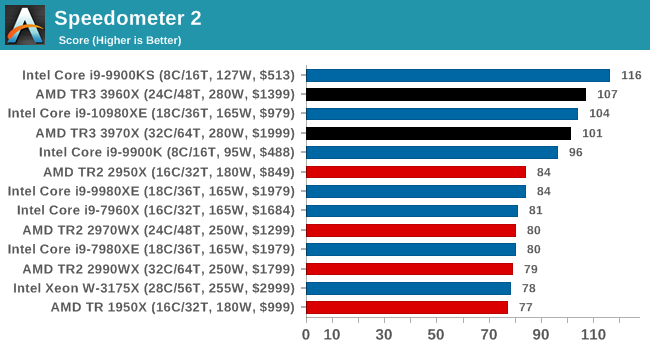
Google Octane 2.0: Core Web Compute
A popular web test for several years, but now no longer being updated, is Octane, developed by Google. Version 2.0 of the test performs the best part of two-dozen compute related tasks, such as regular expressions, cryptography, ray tracing, emulation, and Navier-Stokes physics calculations.
The test gives each sub-test a score and produces a geometric mean of the set as a final result. We run the full benchmark four times, and average the final results.
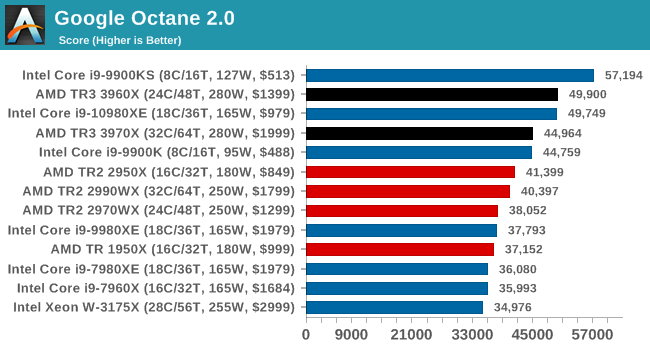
Mozilla Kraken 1.1: Core Web Compute
Even older than Octane is Kraken, this time developed by Mozilla. This is an older test that does similar computational mechanics, such as audio processing or image filtering. Kraken seems to produce a highly variable result depending on the browser version, as it is a test that is keenly optimized for.
The main benchmark runs through each of the sub-tests ten times and produces an average time to completion for each loop, given in milliseconds. We run the full benchmark four times and take an average of the time taken.
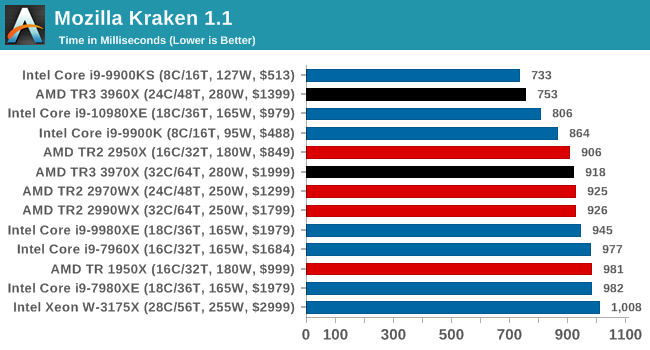
3DPM v1: Naïve Code Variant of 3DPM v2.1
The first legacy test in the suite is the first version of our 3DPM benchmark. This is the ultimate naïve version of the code, as if it was written by scientist with no knowledge of how computer hardware, compilers, or optimization works (which in fact, it was at the start). This represents a large body of scientific simulation out in the wild, where getting the answer is more important than it being fast (getting a result in 4 days is acceptable if it’s correct, rather than sending someone away for a year to learn to code and getting the result in 5 minutes).
In this version, the only real optimization was in the compiler flags (-O2, -fp:fast), compiling it in release mode, and enabling OpenMP in the main compute loops. The loops were not configured for function size, and one of the key slowdowns is false sharing in the cache. It also has long dependency chains based on the random number generation, which leads to relatively poor performance on specific compute microarchitectures.
3DPM v1 can be downloaded with our 3DPM v2 code here: 3DPMv2.1.rar (13.0 MB)
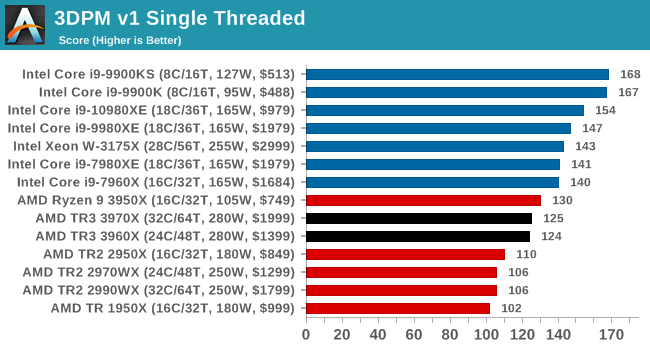
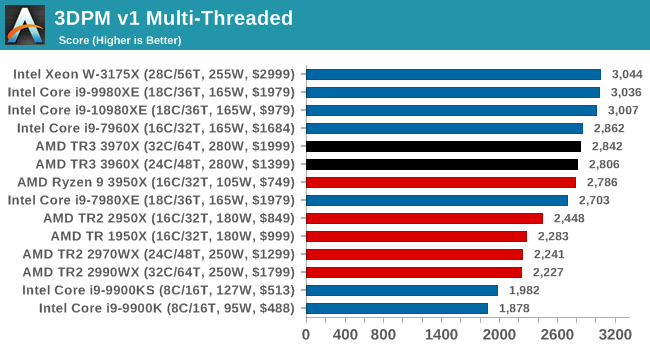
x264 HD 3.0: Older Transcode Test
This transcoding test is super old, and was used by Anand back in the day of Pentium 4 and Athlon II processors. Here a standardized 720p video is transcoded with a two-pass conversion, with the benchmark showing the frames-per-second of each pass. This benchmark is single-threaded, and between some micro-architectures we seem to actually hit an instructions-per-clock wall.
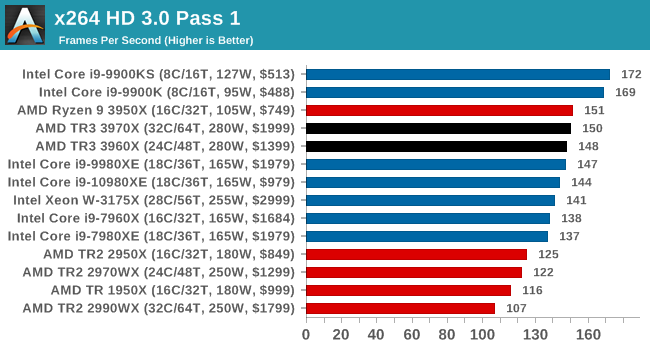
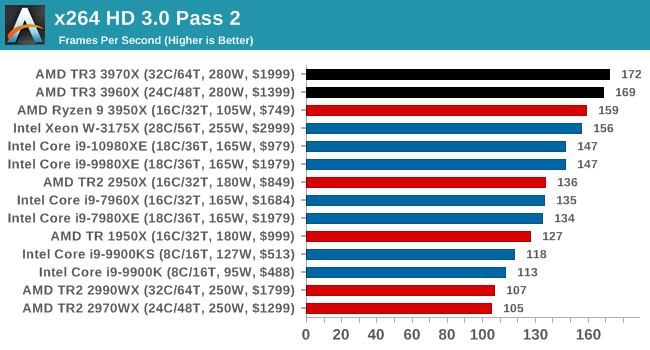
GeekBench4: Synthetics
A common tool for cross-platform testing between mobile, PC, and Mac, GeekBench 4 is an ultimate exercise in synthetic testing across a range of algorithms looking for peak throughput. Tests include encryption, compression, fast Fourier transform, memory operations, n-body physics, matrix operations, histogram manipulation, and HTML parsing.
I’m including this test due to popular demand, although the results do come across as overly synthetic, and a lot of users often put a lot of weight behind the test due to the fact that it is compiled across different platforms (although with different compilers).
We record the main subtest scores (Crypto, Integer, Floating Point, Memory) in our benchmark database, but for the review we post the overall single and multi-threaded results.
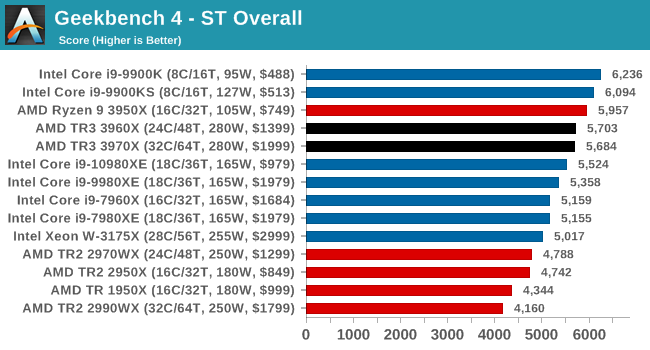
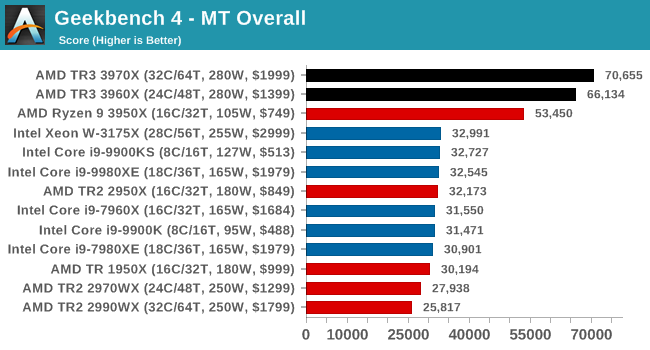










245 Comments
View All Comments
darwi - Monday, November 25, 2019 - link
certainly 60 PCIe4 lanes is best than 48 PCIe3.since SLI is not next best thing for the moment this is quite enough for the most currents setup.
But filling up all those 48 PCIe could be possible with mulitiple storage+network and GPU.
However my main point is that the 10980Xe doing an "ok job" and for some users a 500$ or 1k$ bill is a steep step to jump to the first step of the TR4 lineup.
on the other hand the CM Chipset / Socket instability is a major pain point belonging to intel so far
We will see since Milan is the last iteration of this architecture family before a major architecture revision which certainly require a new socket (according to published roadmaps)
the TR4
blppt - Monday, November 25, 2019 - link
I shouldnt have to keep posting this, but your 7980XE Geekbench MT score is highly inaccurate.I don't overclock anything, and i get 52,000+ consistently.
You either have completely disabled turbo or have some other problem that prevents the cpu from going higher than 2.6 base, because 31K is pathetic.
https://browser.geekbench.com/v4/cpu/14797740
Korguz - Monday, November 25, 2019 - link
blppt is geekbench even reliable ? a quick search.. seems to point in the direction, that it isnt.blppt - Tuesday, November 26, 2019 - link
What difference does it make whether or not GB4 is 'reliable'? They shouldn't be getting such ridiculously low scores for the 7980XE/9980XE, which means that there is something wrong with their configuration.Especially since literally every other cpu result in their chart is within the margins for what everybody else gets in GB4.
Slash3 - Tuesday, November 26, 2019 - link
It may have to do with their memory speed and timings. Reviews specify that the platforms are tested at JEDEC timings for each platform, but have never (to my knowledge) listed the specific subtimings used. For X299, this could easily mean from 2666 CL17-17-17 up to 2666 CL20-20-20. If you're running at, say, 3200 CL14-14-14 it may account for at least some of the difference.blppt - Tuesday, November 26, 2019 - link
Nope. 2666, you can see in the link I provided. Secondly, ram speed would not come close to making up a 20,000 point deficit. Something is wrong with their 18-core Intel setup.prime2515103 - Monday, November 25, 2019 - link
Lisa Sue is my hero. When the day comes that she leaves AMD I am going to cry like a little girl.prime2515103 - Monday, November 25, 2019 - link
oops... Su... lolpeevee - Tuesday, November 26, 2019 - link
She gave Zen architecture to Chinese. Why would she do that, when AMD could have sold them the CPUs? Gaving our the most precious IP you have? Sounds like treason.yeeeeman - Monday, November 25, 2019 - link
I like a these Steven Spielberg type of users commenting here about the cataclysm that is striking Intel. Intel is doomed. Intel doesn't know anything. Intel is this, Intel is that. Intel has only one weakness now, its Fab. Otherwise, we can't know if chiplets were included in their plans for 10 or 7nm. We don't know yet what uarch they have in the pipeline. We see that ice lake is already a better core than zen 2. Probably Zen 3 will close the gap in ipc. Tiger lake brings another 10%. So Intel has responses. But they need to fix their Fab issue...